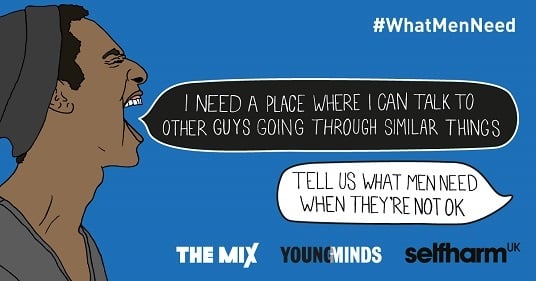The Mix calls for all young men to open up
Thanks to initiatives like Heads Together, Time to Talk and the daily work of UK charities like The Mix, great progress has been made to challenge stigma around mental health and promote healthy conversations over the last twelve months. However, there is a group of people who still find it very difficult to share what’s going on in their lives – young men.
This week, it was Self-Harm Awareness Day. The Mix, along with our campaign partners selfharmUK and YoungMinds, announced that nearly a quarter of young men had turned to self-harm as a way to cope with anxiety, difficult emotions or stress. And 22% of young men had considered it.
The day is an interesting bench mark for The Mix. This will be the fifth year we have supported the campaign. In that time, we have seen the reported prevalence of self-harm as a coping mechanism rise from 9% to over 20%. But this is the first time we have identified that self-harm is just as prevalent in young men as young women.
What is most worrying is that 36% of 16-24-year old men told us that they wouldn’t do anything if they were feeling stressed or under pressure. It is this unwillingness to seek help that can turn a time of challenge into a crisis.
Last year, with the support of City Bridge Trust, we’ve ran series of workshops focused on young men to gain insight into how they might access our services. We saw that young men genuinely struggled to talk about their issues and to break away from the idea that a man who talks about his emotions is a weak one.
The irony is that young men are very good at finding information online but they are reluctant to engage in conversations – particularly when they are about their mental health. This inability to talk is crucial because we know that, when young people talk about their problems, particularly in peer to peer setting, they are better able to cope and build resilience.
Our work with young men has given us a few guidelines. We found that anonymous and men only spaces can be very useful to allow them to open up about their struggles. Likewise, young men were averse to spaces clearly dedicated to seeking support as they felt more comfortable as help givers than help receivers. So, peer to peer champions and more neutrally labelled support settings might help them to engage with their issues and – by stealth – to hear from others that it’s possible to overcome them.
Ultimately, we need young men themselves to speak up and tell us about the conditions that will allow them to engage in healthy conversations about mental health. Our #WhatMenNeed campaign is reaching out through social media to ask young men to tell us directly what they need to say when they’re not okay.
With their input, we can start to build services that do so much more to empower our young men to help themselves and others.
By
Published on 03-Mar-2017
No featured article










